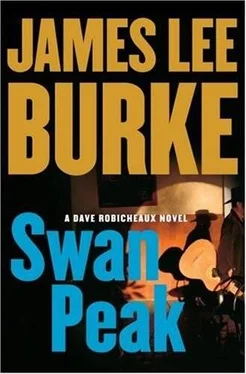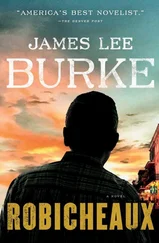James Burke - Swan Peak
Здесь есть возможность читать онлайн «James Burke - Swan Peak» весь текст электронной книги совершенно бесплатно (целиком полную версию без сокращений). В некоторых случаях можно слушать аудио, скачать через торрент в формате fb2 и присутствует краткое содержание. Жанр: Триллер, на английском языке. Описание произведения, (предисловие) а так же отзывы посетителей доступны на портале библиотеки ЛибКат.
- Название:Swan Peak
- Автор:
- Жанр:
- Год:неизвестен
- ISBN:нет данных
- Рейтинг книги:5 / 5. Голосов: 1
-
Избранное:Добавить в избранное
- Отзывы:
-
Ваша оценка:
- 100
- 1
- 2
- 3
- 4
- 5
Swan Peak: краткое содержание, описание и аннотация
Предлагаем к чтению аннотацию, описание, краткое содержание или предисловие (зависит от того, что написал сам автор книги «Swan Peak»). Если вы не нашли необходимую информацию о книге — напишите в комментариях, мы постараемся отыскать её.
Swan Peak — читать онлайн бесплатно полную книгу (весь текст) целиком
Ниже представлен текст книги, разбитый по страницам. Система сохранения места последней прочитанной страницы, позволяет с удобством читать онлайн бесплатно книгу «Swan Peak», без необходимости каждый раз заново искать на чём Вы остановились. Поставьте закладку, и сможете в любой момент перейти на страницу, на которой закончили чтение.
Интервал:
Закладка:
“That lake has mountain peaks under it. The drop-offs go straight down a hundred and thirty feet,” the same agent said.
“Really? I guess that’s how come all them big pike are in there,” Troyce said.
“Did you try to go after him?” a female agent asked. She was the same Amerasian woman he had seen the night Quince Whitley tried to throw acid in Candace’s face.
“The last time I got close to Jimmy Dale, he cut me up and left me to bleed to death. If you ask me, he was a mean little piss-pot and worthless half-breed and deserved worse than what he got. I wish he hadn’t drowned. I wish I could have had the opportunity to stick him in that wood chipper by the log house.”
The Amerasian woman looked at Troyce for a long time. “Do you know it’s a felony to lie to a federal agent who is conducting a criminal investigation?”
“If I got a reason to cover up for that nasty little turd, it’s lost on me. Y’all keep up the good work,” Troyce said. “Say, y’all think I might have a chance of becoming a FBI agent?”
Two weeks later, I placed flowers on the graves of both Seymour Bell and Cindy Kershaw. I didn’t try to contact or console their families, because I believe absolutely without reservation that the worst thing that can happen to human beings is to lose one’s child, and the words we offer by way of solace become salt inside the wound. Instead, I said a prayer over their graves and told them that I hoped they were all right, and I also asked them to watch over me and my family and to keep all of us safe from those who Jesus said should fasten millstones around their necks and cast themselves into the sea.
But sometimes neither prayer nor visiting the graves of homicide victims expunges the images associated with the manner in which they died, and I knew I had to go to the source of their suffering and look him in the face, in the same way a child has to open a closet door and confront the darkness inside in order to be free of it.
Harold Waxman was being held in the Lake County jail, the first of a series of lockups in which he would reside until both state and federal authorities agreed to let him be prosecuted in the jurisdiction where the greatest amount of damage could be done to him by the legal system. The chances that he would be gassed, electrocuted, or injected were minimal. Unlike Ted Bundy, who deliberately committed heinous crimes in Florida – including the rape and murder of a twelve-year-old girl – knowing he would fry if he were caught and prosecuted there, Harold Waxman seemed to have no death wish and killed people for only one reason: He enjoyed it. Consequently, he was more clever than Bundy, less compulsive, and not given to the thespian temptations of televised trials.
I have known police officers and soldiers who I believed to be sociopaths. I have also interviewed sociopaths in death houses in the Huntsville pen, Raiford, Angola, and Parchman. They have one commonality that never varies from individual to individual, replicated in such exact detail that you feel they all know one another and have rehearsed their statements and are taking you over the hurdles. They not only lack remorse for the deeds they have committed; they are bemused when you indicate they should.
I was surprised Waxman consented to the interview, since I had no legal jurisdiction in the state of Montana. For the interview, he was moved from a lockdown unit to a holding cell, one with a barred rather than a solid door. He was wearing an orange jumpsuit and waist and ankle chains, his wrists cuffed close to his hips, his whole body tinkling with steel as he shuffled into the cell. He had been interrupted during his lunch and had brought a sandwich wrapped in foil with him, clenching it with his fingers, although there was no way he could raise it to his mouth. The turnkey locked him in the holding cell and brought me a chair so I could sit outside the bars and not inside the cell.
Waxman’s expression was as flat as a skillet. He’d had a jailhouse haircut, one that had mowed off his sideburns and left a pale rim of skin around his ears and the back of his neck. He was sitting on a steel bunk suspended from wall chains and seemed to have no interest in my presence; if he recognized me, he gave no indication.
“I went out to the graves of Cindy Kershaw and Seymour Bell,” I said.
“Who?” he said.
“The kids you murdered.”
“Oh, you’re talking about those college students. I didn’t kill them. It was Quince Whitley.”
I believed Whitley had been his partner, but to what degree and in the commission of which crimes were open questions that would probably never be resolved. What I did not question was that Waxman was a pathological liar and enjoyed the power his lies gave him and the injury and confusion they caused.
“Tell me, sir, do you think at all about the suffering those kids’ parents have to go through for the rest of their lives?”
“I don’t know their parents. I didn’t know the kids. I won’t say it again.” He kept leaning forward on the bunk, trying to see past me down the corridor.
“Expecting someone?” I said.
“Why are you here?” he replied, ignoring my question. “I mean your real reason, and don’t tell me it’s those kids.”
“When Jamie Sue Wellstone recognized you in the clearing, I saw you hang your head for a minute. Why did you do that, Mr. Waxman? Were you ashamed you sold her down the drain?”
“Yeah, I remember that. I bought a guitar. I paid three grand for it through Musician’s Friend, out in Portland. She was going to show me some chords and runs she used in her songs. So I knew that was out. I wouldn’t have put up three grand for a Martin guitar if I’d known how things were going to work out.”
“Purcel wanted to smoke you. I stopped him,” I said.
“Yeah?” he said, still focused on something behind me.
“Nothing,” I said. “Enjoy your life in the gray-bar hotel chain. I’d ask for lockup and eat out of cans, though. The inmates in the kitchen don’t like psychopaths in main pop.”
“What?”
“Most cons aren’t that much different from the rest of us. They don’t like guys like you,” I said, wondering why I was explaining myself to him.
I walked back down the corridor and wasn’t sure whether he had heard me or not, or even if he cared about the implications of my statement regarding his future. The turnkey was walking toward me, grinning good-naturedly.
“He’s all yours, Cap,” I said.
“He give you what you want?” the turnkey asked.
“More or less,” I lied.
“Good,” the turnkey said. “He didn’t want to talk to you, but I told him I’d find some seasoning for him.”
“Pardon?”
“They aren’t allowed condiments in lockdown. So I told him to bring his sandwich down to the holding cell and I’d find something for him in the coffee room. We got our own little items tucked away. See?” The turnkey held up a bottle of Evangeline hot sauce to illustrate his point.
Down in the pit that had almost become their grave, Candace Sweeney had gotten Jimmy Dale Greenwood loose from the duct tape that had bound his wrists. But Jimmy Dale had effected an escape of another kind without any help from anyone. He had broken out of the prison of fear in which he had lived most of his life. Jimmy Dale had not tried to run and was ready to take his fall and go back to prison. Except it was Troyce Nix who proved to be the surprise in the Cracker Jack box, when his aborted desire for revenge went through a strange transformation. Nix and Candace Sweeney and Jimmy Dale had walked into the trees together, then Nix and Candace had come back without him, and I never saw Jimmy Dale again.
Nix stuck by his story and continued to maintain that Jimmy Dale had drowned in Swan Lake. One month after the shooting, Jamie Sue and her son disappeared from Montana, and I heard nothing about or from her until four months later, when I received a letter postmarked in Upper Hat Creek, British Columbia. It read as follows:
Читать дальшеИнтервал:
Закладка:
Похожие книги на «Swan Peak»
Представляем Вашему вниманию похожие книги на «Swan Peak» списком для выбора. Мы отобрали схожую по названию и смыслу литературу в надежде предоставить читателям больше вариантов отыскать новые, интересные, ещё непрочитанные произведения.
Обсуждение, отзывы о книге «Swan Peak» и просто собственные мнения читателей. Оставьте ваши комментарии, напишите, что Вы думаете о произведении, его смысле или главных героях. Укажите что конкретно понравилось, а что нет, и почему Вы так считаете.












